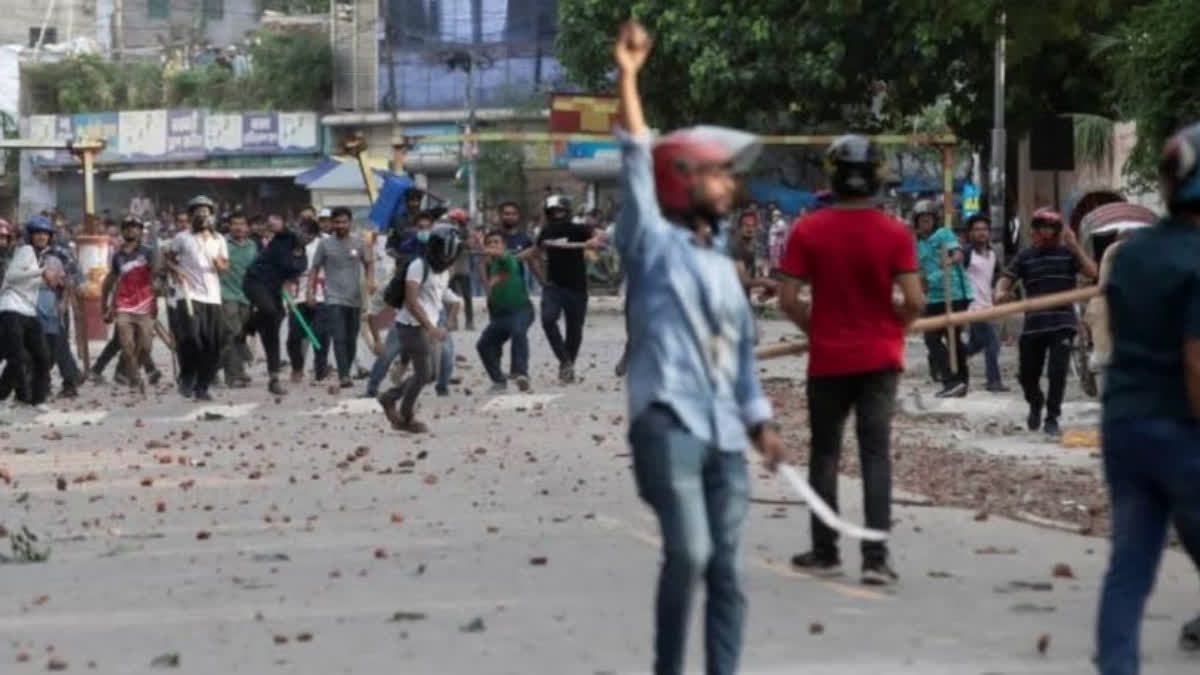Dhaka: Bangladesh's top court on Sunday scaled back a controversial quota system for government job applicants, in a partial victory for student protesters after days of nationwide unrest and deadly clashes between police and demonstrators that have killed scores of people.
Students, frustrated by shortages of good jobs, have been demanding an end to a quota that reserved 30% of government jobs for relatives of veterans who fought in Bangladesh's War of Independence in 1971. The government previously halted it in 2018 following mass student protests, but in June, Bangladesh's High Court reinstated the quotas and set off a new round of protests.
Ruling on an appeal, the Supreme Court ordered that the veterans' quota be cut to 5%, with 93% of jobs to be allocated on merit. The remaining 2% will be set aside for members of ethnic minorities and transgender and disabled people.
The protests have posed the most serious challenge to Bangladesh's government since Prime Minister Sheikh Hasina won a fourth consecutive term in January elections that were boycotted by the main opposition groups. Universities have been closed, the internet has been shut off and the government has ordered people to stay at home.
The protests turned deadly on Tuesday, a day after students at Dhaka University began clashing with police. Violence continued to escalate as police fired tear gas and rubber bullets and hurled smoke grenades to scatter stone-throwing protesters. Bangladeshi authorities haven't shared any official numbers of those killed and injured, but the Daily Prothom Alo newspaper reported Saturday that at least 103 people have died so far.
Sporadic clashes in some parts of Dhaka, the capital, were reported on Saturday but it was not immediately clear whether there were any fatalities. Ahead of the Supreme Court hearing, soldiers patrolled cities across the South Asian country. Home Minister Asaduzzaman Khan said the stay-at-home order will be relaxed from 3 p.m. to 5 p.m. on Sunday for people to run essential errands.
Meanwhile, the government has declared Sunday and Monday as public holidays, with only emergency services allowed to operate. Protesters argue the quota system is discriminatory and benefits supporters of Hasina, whose Awami League party led the independence movement, saying it should be replaced with a merit-based system. Hasina has defended the quota system, saying that veterans deserve the highest respect for their contributions in the war against Pakistan, regardless of their political affiliation.
Representatives from both sides met late Friday in an attempt to reach a resolution and Law Minister Anisul Huq said the government was open to discussing their demands. Their demands included the reform of the current quota system, the reopening of student dormitories shut by the police following the clashes and for some university officials to step down after failing to protect campuses from the violence.
The main opposition Bangladesh Nationalist Party has backed the protests, vowing to organize its own demonstrations as many of its supporters have joined the student-led protests. However, BNP said in a statement its followers were not responsible for the violence and denied the ruling party's accusations of using the protests for political gains.
The Awami League and the BNP have often accused each other of fueling political chaos and violence, most recently ahead of the country's national election, which was marred by a crackdown on several opposition figures. Hasina's government had accused the opposition party of attempting to disrupt the vote.
The other top developments:
- Prime Minister Sheikh Hasina has defended the quota system, saying that veterans deserve the highest respect for their contributions to the war, regardless of their political affiliation.
- General secretary of the ruling Awami League party, Obaidul Quader, said that police officers have been given full powers to open fire on agitators violating the curfew.
- The protests, which began on university campuses, have quickly spread across the country. The clashes between police and protesters left 133 dead, including several police officers.
- The trigger of the unrest is a system which reserves more than half of civil service posts for specific groups, including children of veterans from Bangladesh's fight for independence from Pakistan in 1971.
- The violence forced the Sheikh Hasina-led government to shut down all public and private educational institutions indefinitely, disrupting the lives of many students, including those from India. Nearly 1,000 Indian students have returned from Bangladesh.
- The US State Department has asked Americans not to travel to Bangladesh. The US authorities are withdrawing some diplomats and their families from the country due to the civil unrest.
- Prime Minister Sheikh Hasina further infuriated tensions by comparing the protesters to those who collaborated with Pakistan during the 1971 Bangladesh Liberation War. The government has announced an internet shutdown and social media access has been blocked since Thursday night.
- The protests have evolved from a specific grievance about job quotas into a broader movement against Hasina’s government which has been in power since 2009. The current unrest represents some of the worst violence the country has seen in over a decade.
- Bangladesh government imposed a curfew with thousands of paramilitary forces patrolling cities to pacify agitating students. The curfew was briefly lifted on Saturday afternoon to allow people to move out. (With inputs from AP)



